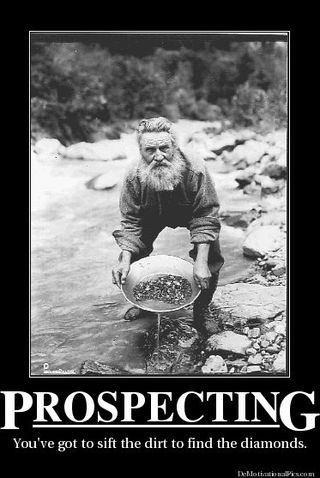As I mentioned earlier this week, I spend roughly half of my work life practicing as a Clinical Psychologist (my first love, really). I enjoy that, on occasion, I get a new and inspiring glimpse into the resiliency and brilliance of the human condition…I love seeing undiscovered treasures that are hidden within each of us, begin to surface.
I went into some detail about one of my clients who is a very successful businessman, and who was also, unfortunately, exposed to many years of significant and continuous childhood trauma. I described how his sanity remained intact due to the fact that he had a very special gift…a gift of being able to boil complex business problems down into simple, core solutions. He took solace in his goal to see this gift used for good in the world.
I had also mentioned that because of his gift, he was drawn to find others who were compelled to exercise their gifts in the world and "find ways to do what others think is impossible." He was motivated to recognize gifts in others and developed some fundamental beliefs about people. To recap, here are three of his beliefs that I mentioned last time:
- There is a Spark of Greatness in everyone…
- Very few leaders are looking to find or develop that spark…
- And, if they are, they never know when they'll run into someone with a special gift to match the needs of their organization.
I also asked these questions of managers:
- Do you look for that Spark of Greatness in others?
- And, when you find it– Do you look to develop it?
- Do you make snap judgements that may lead you to miss potential talent?
I asked my client, "How do you interview to find people who want to develop to their full potential?"
He replied:
"The questions I ask help me figure out whether a person wants to be developed to their fullest. I ask questions that get at whether they can see the difference between bosses who did this previously (mentored them to be their best), and those who didn't, and what their response was to each of them. If they can't resonate with the power of tapping their strengths for the good of the organization and for their own satisfaction, I seriously doubt their ability to find their own spark and attempt the impossible."
He goes onto say:
“I have a firm belief that anyone who is willing to ride out market highs and lows, ups and downs…and be satisfied, isn’t the type of individual who will achieve something special. Instead, I believe it is possible and preferable to be surrounded by people who want to exceed market expectations.”
As I think about his comments, what comes to me is this: You need to be looking for people who hunger for Autonomy (a healthy need to be self-directed), for Mastery (a desire to tackle new learning and new goals), and for Purpose (a higher principle that will fuel their motivation).
Conversely, I asked him what he would recommend to those savvy candidates looking for jobs…What should they ask their prospective managers in order to successfully detect those who want to develop people well? He offered this:
"Candidates should ask a hiring manager, 'What in your career are you most proud of?' The next questions would be, 'Is there an employee (agent) you've worked with that you are most proud of? Why? Tell me about the situation? How is your relationship now? Could I talk with that person?'"
Another line of questioning would seek to uncover how many and what types of people have followed the leader. Good leaders bring their teams with them as they move from company to company. My client explains:
"Ask the hiring manager, 'How many people work for you now, who worked for you in the past? Why did they follow you? Who, if you had a spot, would you recruit right now? Why?' People who naturally think this way will have a bunch of stories off the top of their heads."
How would you, as a manager, answer these questions? Would the most savvy candidates be attracted to you? Would you have powerful and numerous examples of bringing out the best in people? As an owner of a company, how many of your managers would fare well with the most skilled, less desperate candidates?
My guess is that many of you continue to interview as if you only expect the most desperate and time-wasting candidates to request an interview. If that is your default recruiting mindset, then your system of recruiting agents is terribly broken, and you will miss out on the best and the brightest….because the best and the brightest are watching you. You will, by the very nature of recruiting well, have to go through many duds to get to the stars — And the stars don't respond well to arrogance. Let me be clear: The very best candidates will detect disrespect a mile away…and possibly, before the interview ever begins.
Sure, it takes enormous amounts of your effort and energy to make these discoveries, but so does mining for gold or sifting for diamonds…
Editor's Note: This article was written by Dr. David Mashburn. Dave is a Clinical and Consulting Psychologist, a Partner at Tidemark, Inc. and a regular contributor to WorkPuzzle. Comments or questions are welcome. If you're an email subscriber, reply to this WorkPuzzle email. If you read the blog directly from the web, you can click the "comments" link below.

